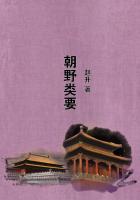The same Baudelot, one day at a masked ball, had been saying a great many civil things to the Dowager Madame, who was there masked, and whom, therefore, he did not know. When he came and saw that it was Madame, he was terrified with affright: the Princess laughed beyond measure at it.
Our Princes here have no particular costume. When they go to the Parliament they wear only a cloak, which, in my opinion, has a very vulgar appearance; and the more so, as they wear the 'collet' without a cravat. Those of the Royal Family have no privileges above the other Dukes, excepting in their seats and the right of crossing over the carpet, which is allowed to none but them. The President, when he addresses them, is uncovered, but keeps his hat on when he speaks to everybody else. This is the cause of those great disputes which the Princes of the blood have had with the bastards, as may be seen by their memorial. The Presidents of the Parliament wear flame-coloured robes trimmed with ermine at the neck and sleeves.
The Comtesse de Soissons, Angelique Cunegonde, the daughter of Francois-
Henri de Luxembourg, has, it must be confessed, a considerable share of virtue and of wit; but she has also her faults, like the rest of the world. It may be said of her that she is truly a poor Princess. Her husband, Louis-Henri, Chevalier de Soissons, was very ugly, having a very long hooked nose, and eyes extremely close to it. He was as yellow as saffron; his mouth was extremely small for a man, and full of bad teeth of a most villanous odour; his legs were ugly and clumsy; his knees and feet turned inwards, which made him look when he was walking like a parrot; and his manner of making a bow was bad. He was rather short than otherwise; but he had fine hair and a large quantity of it. He was rather good-looking when a child. I have seen portraits of him painted at that period. If the Comtesse de Soissons' son had resembled his mother, he would have been very well, for her features are good, and nothing could be better than her, eyes, her mouth, and the turn of her face; only her nose was too large and thick, and her skin was not fine enough.
Whoever is like the Prince Eugene in person cannot be called a handsome man; he is shorter than his elder brother, but, with the exception of Prince Eugene, all the rest of them are good for nothing. The youngest, Prince Philippe, was a great madman, and died of the small-pox at Paris.
He was of a very fair complexion, had an ungraceful manner, and always looked distracted. He had a nose like a hawk, a large mouth, thick lips, and hollow cheeks; in all respects I thought he was like his elder brother. The third brother, who was called the Chevalier de Savoie, died in consequence of a fall from his horse. The Prince Eugene was a younger brother: he had two sisters, who were equally ugly; one of them is dead, and the other is still living (1717) in a convent in Savoy. The elder was of a monstrous shape, but a mere dwarf. She led a very irregular life. She afterwards ran away with a rogue, the Abbe de la Bourlie, whom she obliged to marry her at Geneva; they used to beat each other. She is now dead.
Prince Eugene was not in his younger days so ugly as he has become since; but he never was good-looking, nor had he any nobility in his manner.
His eyes were pretty good, but his nose, and two large teeth which he displayed whenever he opened his mouth, completely spoilt his face. He was besides always very filthy, and his coarse hair was never dressed.
This Prince is little addicted to women, and, during the whole time that he has been here, I never heard one mentioned who has pleased him, or whom he has distinguished or visited more than another.
His mother took no care of him; she brought him up like a scullion, and liked better to stake her money at play than to expend it upon her youngest son. This is the ordinary practice of women in this country.
They will not yet believe that the Persian Ambassador was an impostor;
[This embassy was always equivocal, and even something more. From all that can be understood of it, it would seem that a Minister of one of the Persian provinces, a sort of Intendant de Languedoc, as we might say, had commissioned this pretended Ambassador to manage for him some commercial affairs with certain merchants, and that for his own amusement the agent chose to represent the Persian Ambassador. It is said, too, that Pontchartrain, under whose department this affair fell, would not expose the trick, that the King might be amused, and that he might recommend himself to His Majesty's favour by making him believe that the Sophy had sent him an Ambassador.--Notes to Dangeau's Journal.] it is quite certain that he was a clumsy fellow, although he had some sense. There was an air of magnificence about the way in which he gave audience. He prevailed upon a married woman, who was pregnant by him, to abjure Christianity. It is true she was not a very respectable person, being the illegitimate daughter of my son's chief almoner, the Abbe de Grancey, who always kept a little seraglio. In order to carry her away with him, the Ambassador had her fastened up in a box filled with holes, and then begged that no person might be allowed to touch it, being, as he said, filled with the sacred books written by Mahomet himself, which would be polluted by the contact of Christians. Upon this pretence the permission was given, and by these means the woman was carried off. I cannot believe the story which is told of this Ambassador having had 10,000 louis d'or given him.
I had the misfortune to displease the Margrave John Frederic of Anspach.















